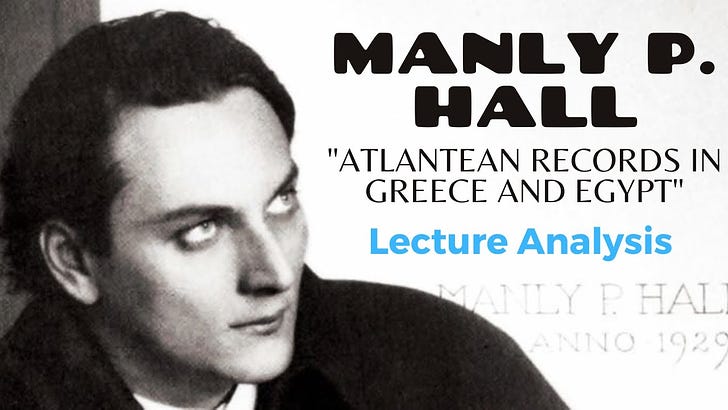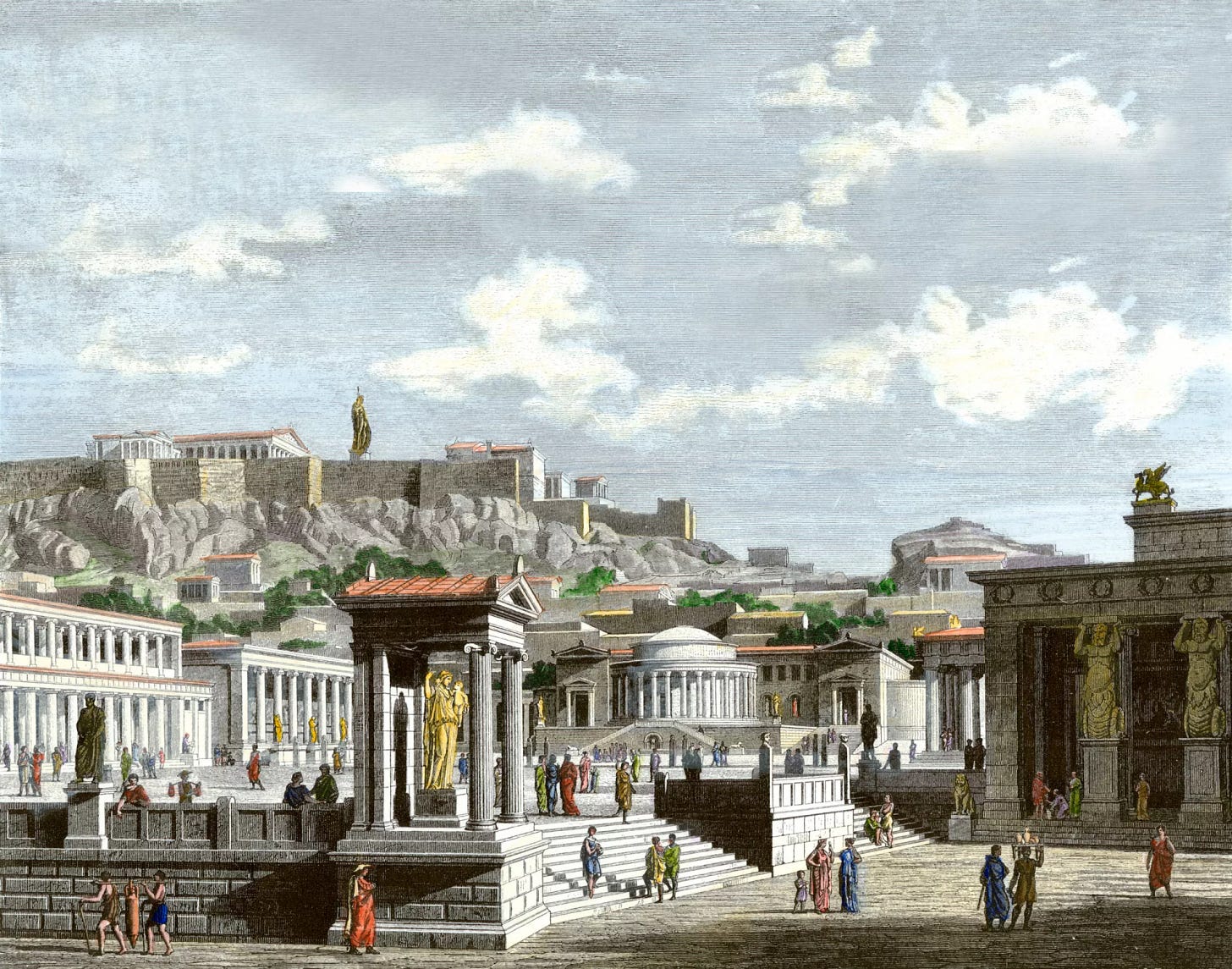Manly P. Hall - "Atlantean Records in Greece and Egypt" | Lecture Notes
Show notes from a recent podcast episode
A few weeks ago I posted on my podcast (“The Wisdom Tradition”), as an addendum to my chapter on Plato, a breakdown of a classic Manly P. Hall lecture on Plato’s myth of Atlantis. You can listen to that episode on my podcast or watch it on my YouTube channel. Posted below are my notes for that episode, which I wrote to accompany the lecture.
Clip 1:
Introduction to Plato’s account of Atlantis
His famous account was derived from Solon’s original accounting of the myth, which he received during his journey to Egypt.
Clip 2a:
Plato, citing Solon’s Egyptian account, gives the date of 9600 BC for the sinking of the Atlantis homeland continent.
At the time, the Atlanteans were attempting an imperial conquest of Europe. The prehistoric Grecians opposed them. Their culture was derived from a rival sociocultural motion: the Arya.
During this campaign, Atlantis sank, leaving this large war party as nomadic migrants.
The Atlantean culture of these migrants re-appears in Egypt (and in the Ancient Americas).
Clip 2b:
Who were the ancient Greeks who opposed the Atlanteans?
MPH implies a relation to a prehistoric Druidic culture derived from Asia.
This implies an association with the “Cycle of the Arya”. By implication, the Atlantean war against the Greeks was actually a war against this competing Aryan racial motion.
In other words, the war represents the last vestiges of the “Fourth Root Race” (the Atlanteans) going to war against the rise of a coming “Fifth Root Race” (the Aryans, derived from the Himalayan region).
Clip 3:
The Egyptian account given to Solon was historical and unembellished.
Plato’s account adds embellishment and incorporates cryptic symbolic elements. Where did he get the added information?
Like Solon, Plato also visited Egypt. But unlike Solon, he was granted initiation into the Mysteries of the Egyptians. This is one possible source of the added information he offers in his account.
Plato’s account also incorporates symbolism derived from his initiation into the Orphic Mysteries of the Greeks.
Clip 4:
Plato’s account incorporates information about the political economy, culture, and religion of the Atlantean empire (based out of the capital city “Poseidonis”).
Many of the core institutions of our civilization, from Plato’s time to today, are derived from this original parent civilization.
Among its key attributes, Plato’s account emphasizes that Atlantis was a great mercantile empire.
Clip 5:
Atlantis was a mercantile empire - i.e. a sea-based economic power with trading colonies established throughout the world.
In those colonized areas, the Atlanteans served as the civilizers of primitive people.
These peripheral cultures were civilized in order that they may participate in the global trade economy of the Atlantean empire.
Clip 6:
The Atlantean island continent was connected by a string of islands to America and possibly also to Europe, forming a more-or-less continuous land bridge.
Furthermore, there is reason to believe that the Atlanteans had ships large enough to traverse long distances.
The continental distribution of this antediluvian period would also have been different: sea levels were lower because large amounts of water were locked in glaciers (see Graham Hancock and Randall Carlson’s recent work on this).
Clip 7:
MPH describes the Atlantean capital as large, wealthy, and with luxurious tastes.
By implication, their empire was “extractive” - resources were pooled from the periphery and concentrated in the capital.
The Atlantean colonization scheme was economically oriented, but had the effect of civilizing and influencing the primitive cultures they encountered.
After the collapse of the Atlantean empire, these “meek” tribes “inherited the Earth”.
Clip 8:
Here, MPH touches on the central thesis of my recent article “Atlantis and the Archetype of Empire”:
The story of Atlantis describes an archetypal pattern of empire.
This archetype has since come to be repeated in different forms throughout the subsequent ages among its various offspring civilizations.
Clip 9:
MPH’s account of the Atlantean empire informs us why myths from cultures around the world reference themselves as having been products from an older and greater parent civilization
Ambassadors from the priesthood of this empire served as civilizing agents for the primitive tribes existing in the periphery of the Atlantean home continent.
The fact that civilization zones from around the world were inspired by a common parent civilization explains many as-yet unexplainable facts about human history.
Clip 10:
MPH describes the Atlantean root race and their culture:
Religion, technology, war, agriculture, language, writing, scholarship, etc. These institutions re-emerge in historical civilization only because these civilizations exist as offshoots of the original Atlantean civilization.
Ancient Egypt and ancient America are the most direct descendants of Atlantis. Their culture is the closest we can image to what Atlantis’s must have been like.
Clip 11:
Ancient myths contain further information about Atlantean culture:
This section serves to summarize what we’ve discussed so far.
Clip 12:
Counterposed to the Atlanteans was the “Cycle of the Arya”
The Aryan migrations moved down from North Asia.
Plato emphasizes that there was no large-scale politically-inspired war until Atlantis’s war against the Aryan/Druidic civilization of prehistoric Greece.
MPH implies that the Atlanteans fell into a desire for material domination that had previously not existed.
Clip 13:
The collapse of Atlantis is related to the Atlanteans’ fall into materiality.
Theme: the Atlanteans moved out of alignment with the Laws of God and destroyed themselves as an inevitable consequence.
This karmic archetype has been repeated innumerable times since.
Clip 14:
Having set forth the core elements of his “Atlantean hypothesis”, MPH surveys the record of ancient myth in order to explore supportive evidence for Plato’s take on Atlantis.
As part of his exploration, Manly Hall goes into further details about the relationship between the Atlantean empire and the colonies they founded on their periphery.
Key point: the Atlanteans were the Promethean civilizers of primitive man.
The Atlanteans’ motives in doing this were not entirely altruistic: the “visitors” were setting up the proper situation for the exchange of goods. They were helping primitive tribes on their periphery to develop skills in order to make products that these civilizers could then take back home and merchandise.
Clip 15:
The Atlantean cultural teachers raised up a priesthood in these primitive tribes whose special institutional task was to perpetuate the wisdom teachings, cultural influences, and economic know-how that that the Atlanteans had give to them.
This they did in two forms: one exoteric, dealing with the outer body of society; the other esoteric, dealing with keeping the sacred wisdom of the Atlantean cultural teachers and the rites of initiation they imparted to their chosen priesthood.
The esoteric teachings were held within a body of elite “elders” of the tribe. These wise ones became the custodians of knowledge and the initiators of select candidates drawn from the lower castes of society.
This explains the origin of the Mystery Schools within the Atlantean successor states. These emerge almost simultaneously throughout postdiluvian Eurasia and ancient America, appearing and re-appearing numerous times in successive waves of cycles.
Clip 16:
Here, MPH discusses the symbolism behind the mythological archetype that there was once a time when the “gods walked with men”.
MPH describes these ancient “gods” as a secondary order/mundane order of gods who existed as embodiments or extensions of yet more primary order of gods, ones who remain permanently enthroned in the heaven/solar world.
To better understand the relationship between these “World Heroes” and the gods they personify, see “Part 3” of this current series on Plato (“The World Soul and the Archetype of Humanity”). See also my series on Mahayana Buddhism, where “the World Heroes” are discussed in terms of the concept of “Bodhisattvas” and “Rishi”.
Clip 17:
Here, MPH discusses the nature of the religious doctrine brought by these Atlantean ambassadors:
It concerns the mysteries of the “One True God”.
This reveals the core of what is taught in the Mystery Schools: one becomes initiated into an experience of the One God.
Clip 18:
What happened to surviving Atlantean cultural ambassadors after the deluge?
They would have integrated with more advanced colonies, forming the foundation of the caste system.
They served as the foundation of dynasties of monarchs and aristocrats who were kept separate (as far as bloodline goes) from non-Atlantean peoples.
This pattern is recapitulated with the migrations of the Arya down from from North India.
In time, however, as postdiluvian civilizations rise and fall, the caste system breaks down and the bloodlines mingle, creating the modern human being.
Clip 19:
More information on the Atlantean collapse. Two key consequences mentioned:
a) Breaking down the colonial relationship between the Atlantean empire and the primitive tribes on its periphery.
b) Its more advanced legacy civilizations would carry on the torch of Atlantis and re-establish empire in the mold of “Poseidonis”. Likely guided by remnants of the Atlantean priesthood.
Clip 20:
Atlantis’s demise associated with the karmic consequences of “disobeying” the laws of the gods. This manifested as their move into war-making and enslaving others.
Their negative karma was impressed upon their legacy civilizations: the rise and fall of pagan empires recreate the archetype of Atlantis’s rise and fall.
This re-expresses the main theme of my recent article “Atlantis and the Archetype of Empire.”





